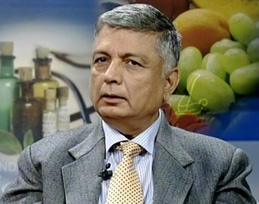Chronic Kidney Disease (CKD)
I am Dr. Ashok Sarin, senior consultant nephrologist at Apollo Hospital, New Delhi. The reason why I am speaking to you is that nowadays people are very concerned about their kidneys and awareness of kidney problems.
Let me tell you that the commonest causes of kidney disease are diabetes and hypertension. As you know that both these diseases are very common and they can give rise to kidney damage. But, there is a lot of prevention in this, and there are a lot of things we can do so that our kidneys remain intact even though we have diabetes and hypertension. Now, in diabetes we must maintain our blood sugar for our staying 100 mg/dL, postprandial, i.e., two hours after meal at 140 mg/dL.
If you are able to maintain your blood sugar at these levels, it is very unlikely that kidney damage will occur. Now the very important early test for finding out whether the kidneys are involved is Microalbuminuria. If your microalbumin is more than 20, then you can, under the supervision of doctors, take additional drugs known as ACE inhibitors or ARBs. But again this has to be under the consultation of your doctor. Now there are many ways which I want to tell you which can prevent you from becoming a diabetic, for example, your weight.
So, if your weight is well under control according to your height and your BMI is maintained, then this is a positive point. Coming to exercise, you must indulge in regular exercises every day, and we must take a diet which is not rich in sugar, sweets and carbohydrates, but a balanced diet of proteins, carbohydrates and vitamins. One should take a diet of about 1600-2000 calories, if a person is lean, a day. You must combine vegetables and appropriate foods in your diet. Of course, smoking is a complete no-no. So, if we adopt a good lifestyle, this will not only benefit our kidneys but also our heart, our brain and eyes. So the whole body benefits by these measures. And of course, the kidneys will always benefit.
The other common cause of kidney damage is hypertension. Very often, we ignore the idea of having regular checkups. Even after the age of 30 nowadays, regular checkup should be done, and at least once a year. If a person is about 40-50 years, then check up should be done after every six months. And very often, the things that we do not anticipate regarding high blood pressure or greater blood sugar is picked up on our blood test or during medical examination.
Today only I had a patient who was about 75 years old and he never knew that he was a diabetic. He was lean and thin, but his HP seen was 12 percent. Now that is double of what it should be, and he is a severe diabetic. And, this was picked up so late because he never went for a medical checkup. And this is very common in our country although on the other hand, there are a lot of people who are very aware and getting regular checkups done. Now our blood pressure should be around 120 over 80 mm Hg, i.e., the systolic pressure should be 120 mm and diastolic pressure should be 80 mm. And once it is 149 Hg, the blood pressure is high and it should be treated by the doctor.
Of course, the weight is a very important factor of hypertension and we find that these people who have put on weight also suffer from hypertension. In both these diseases, people wonder, “Why it has happened to me?” There may be symptoms to indicate that a person has got hypertension or high blood sugar problems. Blood sugar of 130 or 140 mg may not cause any symptoms to the patient, but it is enough to initiate an arterial pathology like diabetic arterial disease or hypertensive arterial disease.
As the arteries are afflicted with both these conditions, that is why slowly the arteries get damaged and the end organs or the target organs like the kidneys get involved. So, we must get regular checkups and if our blood pressure is well below 149 mm Hg, i.e., 155 mm or 125 mm over 80 mm Hg, then we are very unlikely to develop kidney disease because of hypertension. Of course when hypertension does develop, then blood pressure medication should be taken under the supervision of a doctor; even our diabetes dots should be taken under the supervision of a doctor. Of course, I want to add here again that exercise, i.e., regular exercise will help to mitigate the effects of hypertension and reduce the chances of hypertension and diabetes.


+1.svg)
